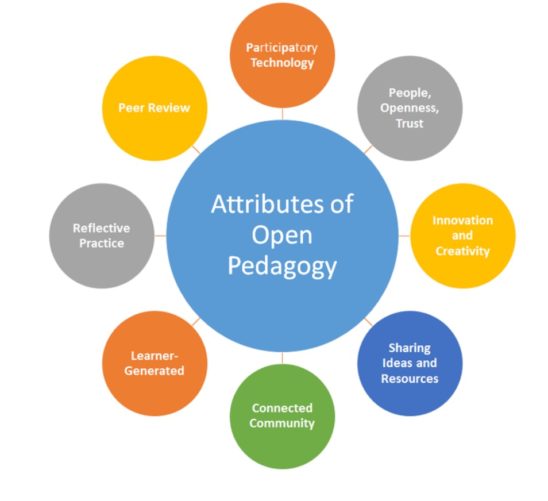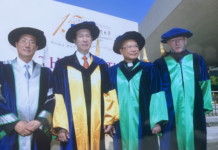
Sorry, folks – Christmas caught up to me faster than my blog writing. Still two more posts to do on 2018. I intended to do just one on pedagogical developments during 2018, but found I needed more space.
Pedagogical developments in 2018
Since the way we learn does not change quickly -or at least it changes more slowly than technological developments, for instance – big changes in teaching methods or the way students approach learning are not likely in the space of one year, so the last two posts in my review of 2018 are more reflective on general trends in this area.
In particular, I want to focus on two issues:
- open pedagogy; and
- developing, for the want of a better term, 21st century skills.
I encountered quite a bit of activity in both these areas in 2018. In this post I will focus on open pedagogy, and in the next and last post of my 2018 review I will focus on developing 21st century skills.
Open pedagogy
A definition
David Wiley (2013) defines Open Pedagogy as
“that set of teaching and learning practices only possible in the context of the free access and 4R permissions characteristic of open educational resources.”
As most of you are aware, the 4R permissions of OER are:
- Free to reuse
- Free to revise
- Free to remix
- Free to redistribute
Thus open pedagogy is basically about a particular use of open educational resources, or at least resources that are openly licensed.
A typical example would be an assignment where students create an entry based on OER that meets the standards for acceptance by Wikipedia, or a class assignment where students must research a topic and base the assignment report on OER.
However, David Wiley has modified his position since then. For a broader definition of open pedagogy, see Curtis (2017).
Open pedagogy has been a strong topic of interest for both BCcampus and eCampus Ontario during 2018. I attended at least three conferences and workshops where there were presentations on and about open pedagogy.
My comments on open pedagogy
This topic really deserves more than just a blog post and I will certainly be focusing more on this topic when I revise Teaching in a Digital Age.
However, the way that open pedagogy has been defined, at least by David Wiley, strikes me as a very narrow view of openness in education.
Ideally, all knowledge resources would be free for learners to use, but realistically, they are not. If you want students to solve a problem, or conduct a piece of research, and the resource they need to do so does not have an open license but is absolutely relevant and necessary for the task, why deny them that opportunity, especially if for instance the resource is copyrighted but available for their free use through a library? I publish as much as possible openly, but I am still willing to buy books from commercial publishers if I believe there is something in them for me to learn from.
The other objection I have to at least a narrow concept of open pedagogy is that the focus is still mainly on the materials. You can use OER or other learning materials in many different ways, and the type of activities students undertake, or the way a teacher teaches, whether the materials are open or not, is what categorises or defines a pedagogy. Just using OER in itself is not a separate or unique pedagogy, as I understand the term. Defining a pedagogy around the use of OER seems to be a false reason for justifying the use of OER, although I am all for students doing self-directed project work, and using OER where possible. But the pedagogy in that case is self-directed learning, not open pedagogy.
My view of open pedagogy
For me, open pedagogy would be a teaching approach that takes into account and deliberately tries to remove any barriers to learning, whether they are financial, cultural, personal, or physical. This would include the teaching of diverse groups, enabling all to succeed. You can never achieve absolute open pedagogy, but you can reach for it. This is why public education is so important – it is still one of the best ways to provide open pedagogy, especially in the k-12 system. Thus open pedagogy to me is much more than the access to and use of OER, although OER can be a valuable component of open pedagogy.
So:
- do I see more use of open educational resources in 2019? Definitely.
- Is it a good thing? Absolutely.
- But is there a unique pedagogy associated with the use of OER? I don’t think so, and if there is, there’s a danger that it could become extremely limiting.
Hype: 4; Significance 1; Reader engagement: 3
References
Curtis, S. (2017) What is open pedagogy? UMKC Online News, Winter,
Hegarty, B. (2015). Attributes of Open Pedagogy: A Model for Using Open Educational Resources. EDUCATIONAL TECHNOLOGY, 4.
Wiley, D. (2013) What is open pedagogy? Iterating towards openness, October 21
Up next
The final post in this review of 2018 is on developing 21st century knowledge and skills.









 Dr. Tony Bates is the author of eleven books in the field of online learning and distance education. He has provided consulting services specializing in training in the planning and management of online learning and distance education, working with over 40 organizations in 25 countries. Tony is a Research Associate with Contact North | Contact Nord, Ontario’s Distance Education & Training Network.
Dr. Tony Bates is the author of eleven books in the field of online learning and distance education. He has provided consulting services specializing in training in the planning and management of online learning and distance education, working with over 40 organizations in 25 countries. Tony is a Research Associate with Contact North | Contact Nord, Ontario’s Distance Education & Training Network.


A critique on the use of the term ooen pedagogy can be found at https://www.tandfonline.com/doi/full/10.1080/01587919.2017.1369350
It is important to note that OER itself does not change teaching and learning. It only provides access and promotes self-directed learning. Another important trend these days is the open textbooks, where OER promote teacher-centred learning. The affordances of OER to make the classroom a resource-based learning environment with the use of multiple media is forgotten in the race to develop open textbooks.
I agree with you. The definition offered by Wiley is far too limiting. I know of no other view or definition of pedagogy that focuses so narrowly on objects (OER) rather than on practices. Many researchers and instructors have come up with definitions of open pedagogy that center around student agency, student driven learning, and collaboration. A broader view of open pedagogy can be found here: http://openpedagogy.org/open-pedagogy/ and here: https://hapgood.us/2018/11/28/the-tensions-of-open-pedagogy/
Online learning is not the right way to gain knowledge as practical experience is also necessary. Did you guys hear about a massage therapist who had earned his degree online and he ended up paralyzing one of his patients by excessive apply force.